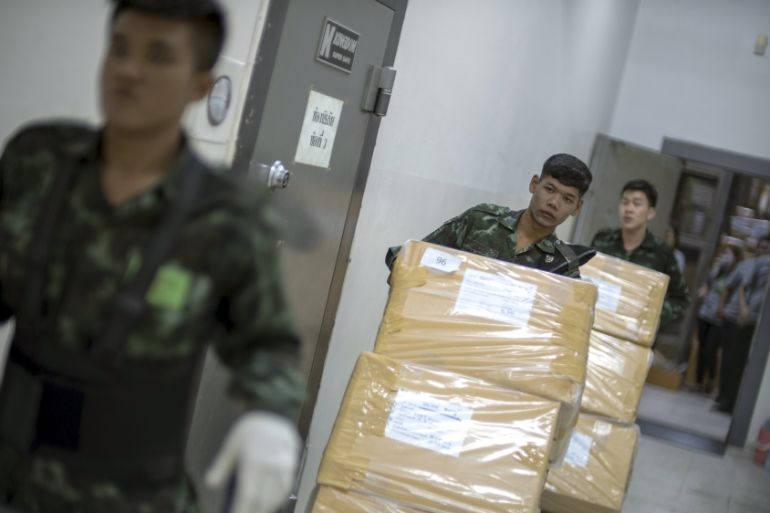Could Duterte take a leaf out of Thailand’s drugs playbook?
While Philippines kills drug dealers en masse, Thailand takes a step back from its own bruising war on drugs.

A few months ago, Harper’s Magazine published a long piece by Dan Baum titled “Legalise it All.”
Even with the momentum of the rapid decriminalisation of marijuana taking place now in the United States, the article’s call for full legalisation of all drugs is clearly going to be too extreme for mainstream North America.
Keep reading
list of 4 itemsWhy are some countries decriminalising drugs?
Tonnes of cocaine seized after high-speed boat chase in Colombia
Germany legalises cannabis possession for personal use from April
Yet in recent days, a proposal just as radical in the context of traditionalist Asia has been making the rounds in Thailand – legalisation of medical marijuana, and even decriminalisation of methamphetamines – perhaps something similar to Portugal, where users are not punished but rather sent to rehab.
What is remarkable is that these suggestions are not coming from rights activists or progressive civil society – instead they are being floated by the country’s military government.
General Paiboon Koomchaya, Thailand’s justice minister, has becoming increasingly vocal in his view that the country’s drug policy “has been wrong the whole time”, and has been calling for drug abuse to be treated as a health issue, instead of a crime.
To get a sense of how unusual this is, compare this with nearby Philippines, where most estimates of the death toll from Rodrigo Duterte’s war on drugs have now passed 3,000.
At least 1,500 people have been killed in the Philippines by the police themselves – the rest by vigilantes inspired by Duterte’s hard-talking, no-quarter stance on drugs.
The stories of victims that have emerged are already heart-wrenching, frustrating and maddening. As the drug war there expands and the full scale of suffering comes into sharper view, it will only get worse.
READ MORE: Executing drug dealers in Southeast Asia
Thailand knows. When it comes to wars on drugs, it’s been there, done that. Now, 13 years later, it is still counting the costs. The parallels to the Philippines are strong, and Manila would do well to pay attention.
In February 2003, when then Thai prime minister Thaksin Shinawatra launched his war on drugs, it was criticised by human rights groups, yet was wildly popular among a public who shared his view that drug dealers and abusers were a social menace.
Soon, newspapers were tallying up body counts in the thousands – an independent inquiry eventually put the toll at more than 2,800 killed.
Worse, an official investigation raised questions as to whether half of those killed even had any connections to drugs.
Prison populations shot up, and have stayed up, Thailand is now struggling to house its 321,347 prisoners, 70 percent of whom are there on drug-related charges.
Many of them were jailed as teenagers, and are still serving out decades-long sentences for relatively petty offences.
Thailand now has 40 percent of ASEAN’s prison population, even though it has only 10 percent of its overall population.
The ends also did not justify the means.
In 2003, Thaksin was confounded by the rise of yaba, “the madness drug” – a regional form of methamphetamine.
Despite the killings and the incarcerations, yaba users grow in numbers in Thailand and in neighbouring countries.
READ MORE: Philippines – inside Duterte’s killer drug war
The United Nations’ drug agency estimates that heroin and methamphetamine trade in the Golden Triangle, an area at the borders of Myanmar, Laos, and Thailand where opium production thrives, is worth $30bn annually – more than the official gross national products of Laos and Cambodia combined.
All this has led to an awakening among senior officials in Thailand, who are now holding serious high-level discussions on how to rethink the problem.
Full legalisation brings the lucrative prospect of taxing the drugs, and would also move production of meth out of labs hidden in the jungle into cleaner, better-regulated facilities.
But few here think such a move is realistic.
For one thing, many Thais are still all for the war on drugs, leading to a strange dynamic where a military government is mulling over proposals it worries are too progressive for its public.